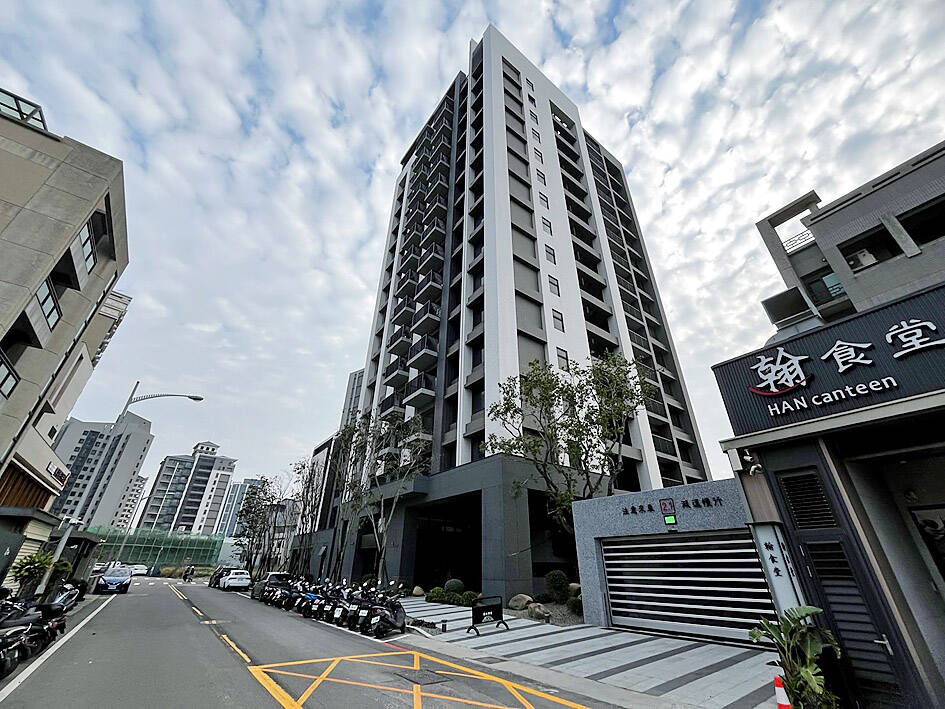Developers and builders last year rolled out NT$2.1 trillion (US$67.71 billion) of presale projects, representing a 6 percent gain from a year earlier, though the number of units shrank 12.5 percent to 104,834, Shining Building Business Co (鄉林建設) said yesterday, citing data compiled by local associations of real-estate developers.
The Taichung-based company is looking at a flat market this year as uncertainty lingers despite an expected modest economic recovery in Taiwan.
The housing market took a hit in the first three quarters of last year from bans on transfers of purchase agreements for pre-sold and newly constructed homes as well as higher building costs and interest rate hikes, Shining chairman Lai Cheng-i (賴正鎰) said at a media gathering in Taipei.

Photo: Hsu Yi-ping, Taipei Times
The market managed to stage a pickup in the final quarter after the central bank halted monetary tightening and the government introduced favorable lending terms for first-home purchases, Lai said.
Buyers who earlier stayed on the sidelines gradually rejoined the market and lent support to sales of small apartments, the Shining chairman said.
Apartments of 23 to 55 ping (181m2) would continue to dominate the market this year with presale house transactions and prices likely to hold steady, he added.
It is unlikely that developers would lower selling prices as the carbon tax alone would drive up construction costs by 15 percent, he said, pointing out that cement suppliers have announced a 15 percent price increase.
The carbon tax would also seriously affect glass and plastic pipe manufacturers, he added.
Environmental policies would contribute to the higher costs of goods and services, which would be passed on to consumers eventually, Lai said.
In response, developers have put urban renewal projects on hold in the hope that land owners would concede and allow developers more room for profit, he said.
The Ministry of the Interior yesterday said that the carbon tax would have a very limited impact at about 0.9 percent of total building costs, adding that developers should not use it as an excuse to hike prices.
Shining plans to launch a renewal project in Taipei’s
Zhongshan District (中山) later this month after winning approval from all land owners, Lai said.
The plot of 1,100 ping would be turned into a mixed-use complex with 123 residential units and 6 storefronts that might generate NT$13 billion in total sales, he said.
Shining also plans to roll out more than 200 apartment units later on a plot of 1,600 ping in Yunlin County, attracted by the improving infrastructure in the county’s Douliou City (斗六), Huwei Township (虎尾) and Dounan Township (斗南), Lai said.

Semiconductor business between Taiwan and the US is a “win-win” model for both sides given the high level of complementarity, the government said yesterday responding to tariff threats from US President Donald Trump. Home to the world’s largest contract chipmaker, Taiwan Semiconductor Manufacturing Co (TSMC, 台積電), Taiwan is a key link in the global technology supply chain for companies such as Apple Inc and Nvidia Corp. Trump said on Monday he plans to impose tariffs on imported chips, pharmaceuticals and steel in an effort to get the producers to make them in the US. “Taiwan and the US semiconductor and other technology industries

SMALL AND EFFICIENT: The Chinese AI app’s initial success has spurred worries in the US that its tech giants’ massive AI spending needs re-evaluation, a market strategist said Chinese artificial intelligence (AI) start-up DeepSeek’s (深度求索) eponymous AI assistant rocketed to the top of Apple Inc’s iPhone download charts, stirring doubts in Silicon Valley about the strength of the US’ technological dominance. The app’s underlying AI model is widely seen as competitive with OpenAI and Meta Platforms Inc’s latest. Its claim that it cost much less to train and develop triggered share moves across Asia’s supply chain. Chinese tech firms linked to DeepSeek, such as Iflytek Co (科大訊飛), surged yesterday, while chipmaking tool makers like Advantest Corp slumped on the potential threat to demand for Nvidia Corp’s AI accelerators. US stock

The US Federal Reserve is expected to announce a pause in rate cuts on Wednesday, as policymakers look to continue tackling inflation under close and vocal scrutiny from US President Donald Trump. The Fed cut its key lending rate by a full percentage point in the final four months of last year and indicated it would move more cautiously going forward amid an uptick in inflation away from its long-term target of 2 percent. “I think they will do nothing, and I think they should do nothing,” Federal Reserve Bank of St Louis former president Jim Bullard said. “I think the

SUBSIDIES: The nominee for commerce secretary indicated the Trump administration wants to put its stamp on the plan, but not unravel it entirely US President Donald Trump’s pick to lead the agency in charge of a US$52 billion semiconductor subsidy program declined to give it unqualified support, raising questions about the disbursement of funds to companies like Intel Corp and Taiwan Semiconductor Manufacturing Co (台積電). “I can’t say that I can honor something I haven’t read,” Howard Lutnick, Trump’s nominee for commerce secretary, said of the binding CHIPS and Science Act awards in a confirmation hearing on Wednesday. “To the extent monies have been disbursed, I would commit to rigorously enforcing documents that have been signed by those companies to make sure we get